 W
WThe law of war is the component of international law that regulates the conditions for war and the conduct of warring parties. Laws of war define sovereignty and nationhood, states and territories, occupation, and other critical terms of international law.
 W
WAn Act further to protect the commerce of the United States, is an act of Congress approved July 9, 1798, authorizing the President of the United States to use military force in the Quasi-War with France.
 W
WLegality of the Threat or Use of Nuclear Weapons [1996] ICJ 2 is a landmark international law case, where the International Court of Justice gave an advisory opinion stating that there is no source of law, customary or treaty, that explicitly prohibits the possession or even use of nuclear weapons. The only requirement being that their use must be in conformity with the law on self-defence and principles of international humanitarian law.
 W
WCapitulation is an agreement in time of war for the surrender to a hostile armed force of a particular body of troops, a town or a territory.
 W
WCelle Hole was a breach in the outer wall of the prison of Celle, Germany. First used on July 25, 1978, the name was part of a campaign by one of the West German secret services and the GSG 9 in an attempt to lay blame on the Red Army Faction, West Germany's most active and prominent left-wing terrorist group. However, the incident was revealed in 1986 to be a plot by the government, a False flag operation, much to the embarrassment of the government. The Verfassungsschutz used the name 'Operation Fire Magic'.
 W
WCivilian casualties occur in a general sense, when civilians are killed or injured by non-civilians, mostly law enforcement officers, military personnel, or criminals such as terrorists and bank robbers. Under the law of war, it is referred to civilians who perished or suffered wounds as a result of wartime acts. In both cases, they can be associated with the outcome of any form of action regardless of whether civilians were targeted directly or not.
 W
WCommand responsibility, sometimes referred to as the Yamashita standard or the Medina standard, and also known as superior responsibility, is the legal doctrine of hierarchical accountability for war crimes.
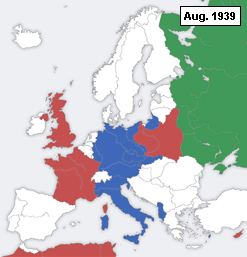 W
WThis is a timeline of declarations of war during World War II.
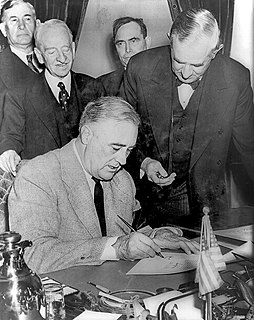 W
WA declaration of war is a formal act by which one state goes to war against another. The declaration is a performative speech act by an authorized party of a national government, in order to create a state of war between two or more states.
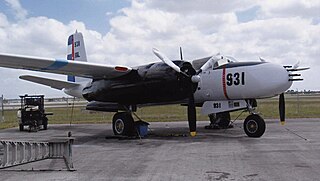 W
WA false flag operation is an act committed with the intent of disguising the actual source of responsibility and pinning blame on a second party. The term is popular amongst conspiracy theory promoters in referring to covert operations of various governments and cabals.
 W
WFrancs-tireurs were irregular military formations deployed by France during the early stages of the Franco-Prussian War (1870–71). The term was revived and used by partisans to name two major French Resistance movements set up to fight against the Germans during World War II.
 W
WA hudna is a truce or armistice. It is sometimes translated as "cease-fire". In his medieval dictionary of classical Arabic, the Lisan al-Arab, Ibn Manzur defined it as:"hadana: he grew quiet. hadina: he quieted. haadana: he made peace with. The noun from each of these is hudna."
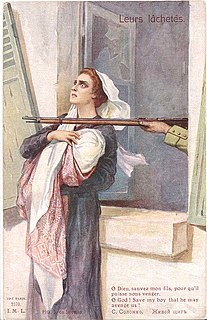 W
WHuman shield is a legal, military and political term denoting a non-combatant who is either forced or volunteers to shield a legitimate military target in order to deter the enemy from attacking it. The use of human shields as a resistance measure was popularized by Mahatma Gandhi as a weapon of peace. On the other hand, the weaponization of civilians has also developed as a tactic by some non-state actors like ISIS, a tactic developed by Germany in the Franco-Prussian War in 1870.
 W
WIslamic military jurisprudence refers to what has been accepted in Sharia and Fiqh by Ulama as the correct Islamic manner, expected to be obeyed by Muslims, in times of war. Some scholars and Muslim religious figures describe armed struggle based on Islamic principles as the Lesser jihad.
 W
WIstijarah is an Islamic term for asylum, accepting a person at risk as a member of own tribe.
 W
WJust war theory is a doctrine, also referred to as a tradition, of military ethics studied by military leaders, theologians, ethicists and policy makers. The purpose of the doctrine is to ensure war is morally justifiable through a series of criteria, all of which must be met for a war to be considered just. The criteria are split into two groups: "right to go to war" and "right conduct in war" . The first concerns the morality of going to war, and the second the moral conduct within war. Recently there have been calls for the inclusion of a third category of just war theory—jus post bellum—dealing with the morality of post-war settlement and reconstruction.
 W
WThe Anat Kamm–Uri Blau affair refers to a leak of thousands of classified Israel Defense Forces (IDF) documents by the former Israeli soldier Anat Kamm.
 W
WThe Kellogg–Briand Pact or Pact of Paris – officially the General Treaty for Renunciation of War as an Instrument of National Policy – is a 1928 international agreement in which signatory states promised not to use war to resolve "disputes or conflicts of whatever nature or of whatever origin they may be, which may arise among them". The pact was signed by Germany, France, and the United States on 27 August 1928, and by most other states soon after. Sponsored by France and the U.S., the Pact is named after its authors, United States Secretary of State Frank B. Kellogg and French foreign minister Aristide Briand. The pact was concluded outside the League of Nations and remains in effect.
 W
WIn German-speaking countries, the term Landsturm was historically used to refer to militia or military units composed of troops of inferior quality. It is particularly associated with Prussia, Germany, Austria-Hungary, Sweden and the Netherlands.
 W
WThe Lord Eliot Convention, or simply the Eliot Convention or Eliot Treaty, was an April 1835 agreement brokered by Edward Eliot, 3rd Earl of St Germans between the two opposing sides of the First Carlist War. It had as its aim not to end the war itself but to end the indiscriminate executions by firing squad that had been committed by both sides.
 W
WA neutral country is a state that is neutral towards belligerents in a specific war or holds itself as permanently neutral in all future conflicts. As a type of non-combatant status, nationals of neutral countries enjoy protection under the law of war from belligerent actions to a greater extent than other non-combatants such as enemy civilians and prisoners of war.
 W
WThe neutral powers were countries that remained neutral during World War II. Some of these countries had large colonies abroad or had great economic power. Spain had just been through its civil war, which ended on 1 April 1939 —a war that involved several countries that subsequently participated in World War II.
 W
WNuremberg and Vietnam: An American Tragedy is a book written by Telford Taylor, the Chief Counsel Prosecutor at the Nuremberg Trials.
 W
WIn war, an open city is a settlement which has announced it has abandoned all defensive efforts, generally in the event of the imminent capture of the city to avoid destruction. Once a city has declared itself an open city, the opposing military will be expected to peacefully occupy the city rather than destroy it. The concept aims to protect the city's civilians and cultural landmarks from a battle which may be futile.
 W
WA Parlimentaire is defined by the U.S. Department of Defense as "an agent employed by a commander of belligerent forces in the field to go in person within the enemy lines for the purpose of communicating or negotiating openly and directly with the enemy commander".
 W
WA peace treaty is an agreement between two or more hostile parties, usually countries or governments, which formally ends a state of war between the parties. It is different from an armistice, which is an agreement to stop hostilities; a surrender, in which an army agrees to give up arms; or a ceasefire or truce, in which the parties may agree to temporarily or permanently stop fighting. The art of negotiating a peace treaty in the modern era has been referred to by legal scholar Christine Bell as the lex pacificatoria, with a peace treaty potentially contributing to the legal framework governing the post conflict period, or jus post bellum.
 W
WJean Simon Pictet was a Swiss citizen, jurist, legal practitioner working in international humanitarian law. First as a secretary-jurist, and then as a senior executive and Vice-President of the International Committee of the Red Cross (ICRC), Pictet was instrumental in drafting the 1949 Geneva Conventions for the protection of victims of war, their Commentaries, and negotiating the 1977 Additional Protocols. He also proposed the Red Cross Movement’s seven Fundamental Principles, which were adopted at Vienna in 1965: Humanity, Impartiality, Neutrality, Independence, Voluntary Service, Unity and Universality. In 1989, an international humanitarian law competition for students was founded and named after him.
 W
WIn military/security studies and international relations, "police action" is a military action undertaken without a formal declaration of war. Today the term counter-insurgency is more used.
 W
WPostal censorship is the inspection or examination of mail, most often by governments. It can include opening, reading and total or selective obliteration of letters and their contents, as well as covers, postcards, parcels and other postal packets. Postal censorship takes place primarily but not exclusively during wartime and periods of unrest, and occasionally at other times, such as periods of civil disorder or of a state of emergency. Both covert and overt postal censorship have occurred.
 W
WThe rules and regulations concerning prisoners of war in Islam are covered in manuals of Islamic jurisprudence, based upon Islamic teachings, in both the Qur'an and hadith.
 W
WRules of engagement (ROE) are the internal rules or directives among military forces that define the circumstances, conditions, degree, and manner in which the use of force, or actions which might be construed as provocative, may be applied. They provide authorization for and/or limits on, among other things, the use of force and the employment of certain specific capabilities. In some nations, ROE has the status of guidance to military forces, while in other nations, ROE is lawful commands. Rules of engagement do not normally dictate how a result is to be achieved, but will indicate what measures may be unacceptable.
 W
WSafe conduct, or letters of transit, is the situation in time of international conflict or war where one state, a party to such conflict, issues to a person a pass or document to allow the enemy alien to traverse its territory without harassment, bodily harm, or fear of death. Safe conduct is only granted in exceptional circumstances. It may be given to an enemy to allow retreat under surrender terms, or for a meeting to negotiate; to a stateless person; or to somebody who for some reason would normally not be able to pass. A vanquished enemy can also be given, or offered quarter, i.e. be spared, be promised or guaranteed mercy.
 W
WA summary execution is an execution in which a person is accused of a crime and immediately killed without the benefit of a full and fair trial. Executions as the result of summary justice are sometimes included, but the term generally refers to capture, accusation, and execution all conducted within a very short period of time, and without any trial. Under international law, refusal to accept lawful surrender in combat and instead killing the person surrendering is also categorized as a summary execution.
 W
WSuperior orders, often known as the Nuremberg defense, just following orders, Due Obedience, or by the German phrase Befehl ist Befehl, is a plea in a court of law that a person, whether a member of the military, law enforcement, a firefighting force, or the civilian population, should not be considered guilty of committing actions that were ordered by a superior officer or official.
 W
WSurrender, in military terms, is the relinquishment of control over territory, combatants, fortifications, ships or armament to another power. A surrender may be accomplished peacefully, without fighting, or it may be the result of defeat in battle. A sovereign state may surrender following defeat in a war, usually by signing a peace treaty or capitulation agreement. A battlefield surrender, either by individuals or when ordered by officers, normally results in those surrendering becoming prisoners of war.
 W
WTargeted killing is defined as a form of killing carried out by governments. Some analysts believe that it is a modern euphemism for the assassination of an individual by a state organization or institution outside a judicial procedure or a battlefield.
 W
WTargeted Killing in International Law is a book about the legality of targeted killing, written by Nils Melzer. It was first published by Oxford University Press in May 2008. The book explores the history of targeted killing as a government strategy by multiple countries including the United States, the United Kingdom, Israel, Switzerland and Germany; for both military and law enforcement purposes. Melzer argues that directly after the September 11 attacks in the United States, perceptions of the tactic became more positive.
 W
WTargeted Killings: Law and Morality in an Asymmetrical World is a non-fiction compilation book about targeted killing edited by Claire Finkelstein, Jens David Ohlin, and Andrew Altman. It was published by Oxford University Press in 2012. The book grew out of contributions by the authors to a conference in April 2011 at the University of Pennsylvania Law School. Targeted Killings features eighteen essays in five sections arranged by topic. The work argues that after the 11 September attacks by Al-Qaeda in 2001, the United States and other countries began to see the tactic of targeted killing differently. The practice of targeted killing had previously been accepted in situations of self-defence in military settings; after 11 September 2001 it was used to kill non-combatants and those not directly involved in a particular armed force.
 W
WThe military courts of the United Kingdom are governed by the Armed Forces Act 2006. The system set up under the Act applies to all three armed services: the Royal Navy (RN), the British Army, and the Royal Air Force (RAF), and replaces the three parallel systems that were previously in existence.
 W
WAn unlawful combatant, illegal combatant or unprivileged combatant/belligerent is, according to United States law, a person who directly engages in armed conflict in violation of the laws of war and therefore not protected by the Geneva Conventions. The International Committee of the Red Cross points out that the terms "unlawful combatant", "illegal combatant" or "unprivileged combatant/belligerent" are not defined in any international agreements.
 W
WWar can heavily damage the environment, and warring countries often place operational requirements ahead of environmental concerns for the duration of the war. Some international law is designed to limit this environmental harm.
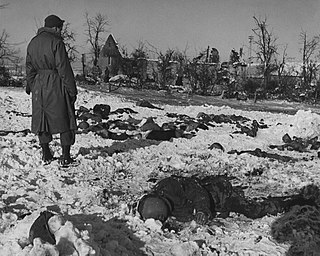 W
WA war crime is an act that constitutes a serious violation of the laws of war that gives rise to individual criminal responsibility. Examples of crimes include intentionally killing civilians or prisoners, torturing, destroying civilian property, taking hostages, performing a perfidy, raping, using child soldiers, pillaging, declaring that no quarter will be given, and seriously violating the principles of distinction, proportionality, and military necessity.
 W
WThe War Crimes Act 1991 is an Act of the Parliament of the United Kingdom. It confers jurisdiction on courts in the United Kingdom to try people for war crimes committed in Nazi Germany or German-occupied territory during the Second World War by people who were not British citizens at the time, but have since become British citizens or residents. The legislation was enacted, as there then were no provisions to allow the extradition of British residents, or naturalised citizens to face trial for war crimes in third countries. Other countries, such as the United States have used civil, rather than criminal proceedings, to resolve this issue by revoking citizenship of suspects, facilitating their deportation.
 W
WThe War Crimes Act of 1996 is a law that defines a war crime to include a "grave breach of the Geneva Conventions", specifically noting that "grave breach" should have the meaning defined in any convention to which the United States is a party. The definition of "grave breach" in some of the Geneva Conventions have text that extend additional protections, but all the Conventions share the following text in common: "... committed against persons or property protected by the Convention: willful killing, torture or inhuman treatment, including biological experiments, willfully causing great suffering or serious injury to body or health."
 W
WA war trophy is an item taken during warfare by an invading force. Common war trophies include flags, weapons, vehicles, and art.
 W
WWhite flags have had different meanings throughout history and depending on the locale.
 W
WThe woodchoppers of the Orne were 10 Flemish soldiers during the First World War punished for their active or passive involvement in the Flemish Movement in the Belgian Army. They were removed from their platoons and moved to a penal military unit called the Special Forestry Platoon in 1918. In this penal military unit, stationed in Orne, Normandy in France, they had to work as woodchoppers as unfree labour. They were required to work 12 hours a day in harsh living conditions, they were paid 1 Belgian franc each day.